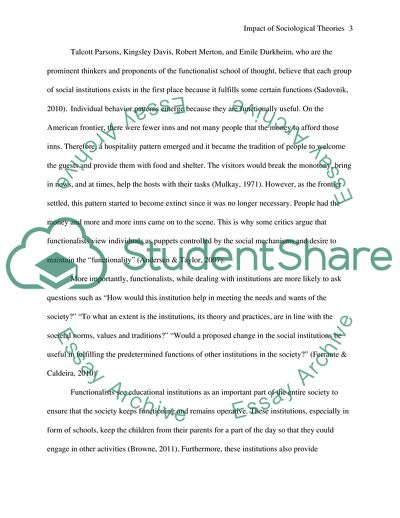Cite this document
(Impact of Sociological Theories Report Example | Topics and Well Written Essays - 2250 words, n.d.)
Impact of Sociological Theories Report Example | Topics and Well Written Essays - 2250 words. https://studentshare.org/sociology/1755868-evaluate-the-impact-the-sociological-theories-functionalism-conflict-and-interactionism-has-by-choosing-one-of-the-social-institution-selected-from-the-list-below
Impact of Sociological Theories Report Example | Topics and Well Written Essays - 2250 words. https://studentshare.org/sociology/1755868-evaluate-the-impact-the-sociological-theories-functionalism-conflict-and-interactionism-has-by-choosing-one-of-the-social-institution-selected-from-the-list-below
(Impact of Sociological Theories Report Example | Topics and Well Written Essays - 2250 Words)
Impact of Sociological Theories Report Example | Topics and Well Written Essays - 2250 Words. https://studentshare.org/sociology/1755868-evaluate-the-impact-the-sociological-theories-functionalism-conflict-and-interactionism-has-by-choosing-one-of-the-social-institution-selected-from-the-list-below.
Impact of Sociological Theories Report Example | Topics and Well Written Essays - 2250 Words. https://studentshare.org/sociology/1755868-evaluate-the-impact-the-sociological-theories-functionalism-conflict-and-interactionism-has-by-choosing-one-of-the-social-institution-selected-from-the-list-below.
“Impact of Sociological Theories Report Example | Topics and Well Written Essays - 2250 Words”. https://studentshare.org/sociology/1755868-evaluate-the-impact-the-sociological-theories-functionalism-conflict-and-interactionism-has-by-choosing-one-of-the-social-institution-selected-from-the-list-below.


